Xiaodong Liu
Statistical Estimation of Adversarial Risk in Large Language Models under Best-of-N Sampling
Jan 30, 2026Abstract:Large Language Models (LLMs) are typically evaluated for safety under single-shot or low-budget adversarial prompting, which underestimates real-world risk. In practice, attackers can exploit large-scale parallel sampling to repeatedly probe a model until a harmful response is produced. While recent work shows that attack success increases with repeated sampling, principled methods for predicting large-scale adversarial risk remain limited. We propose a scaling-aware Best-of-N estimation of risk, SABER, for modeling jailbreak vulnerability under Best-of-N sampling. We model sample-level success probabilities using a Beta distribution, the conjugate prior of the Bernoulli distribution, and derive an analytic scaling law that enables reliable extrapolation of large-N attack success rates from small-budget measurements. Using only n=100 samples, our anchored estimator predicts ASR@1000 with a mean absolute error of 1.66, compared to 12.04 for the baseline, which is an 86.2% reduction in estimation error. Our results reveal heterogeneous risk scaling profiles and show that models appearing robust under standard evaluation can experience rapid nonlinear risk amplification under parallel adversarial pressure. This work provides a low-cost, scalable methodology for realistic LLM safety assessment. We will release our code and evaluation scripts upon publication to future research.
GeoNorm: Unify Pre-Norm and Post-Norm with Geodesic Optimization
Jan 29, 2026Abstract:The placement of normalization layers, specifically Pre-Norm and Post-Norm, remains an open question in Transformer architecture design. In this work, we rethink these approaches through the lens of manifold optimization, interpreting the outputs of the Feed-Forward Network (FFN) and attention layers as update directions in optimization. Building on this perspective, we introduce GeoNorm, a novel method that replaces standard normalization with geodesic updates on the manifold. Furthermore, analogous to learning rate schedules, we propose a layer-wise update decay for the FFN and attention components. Comprehensive experiments demonstrate that GeoNorm consistently outperforms existing normalization methods in Transformer models. Crucially, GeoNorm can be seamlessly integrated into standard Transformer architectures, achieving performance improvements with negligible additional computational cost.
DANCER: Dance ANimation via Condition Enhancement and Rendering with diffusion model
Oct 31, 2025



Abstract:Recently, diffusion models have shown their impressive ability in visual generation tasks. Besides static images, more and more research attentions have been drawn to the generation of realistic videos. The video generation not only has a higher requirement for the quality, but also brings a challenge in ensuring the video continuity. Among all the video generation tasks, human-involved contents, such as human dancing, are even more difficult to generate due to the high degrees of freedom associated with human motions. In this paper, we propose a novel framework, named as DANCER (Dance ANimation via Condition Enhancement and Rendering with Diffusion Model), for realistic single-person dance synthesis based on the most recent stable video diffusion model. As the video generation is generally guided by a reference image and a video sequence, we introduce two important modules into our framework to fully benefit from the two inputs. More specifically, we design an Appearance Enhancement Module (AEM) to focus more on the details of the reference image during the generation, and extend the motion guidance through a Pose Rendering Module (PRM) to capture pose conditions from extra domains. To further improve the generation capability of our model, we also collect a large amount of video data from Internet, and generate a novel datasetTikTok-3K to enhance the model training. The effectiveness of the proposed model has been evaluated through extensive experiments on real-world datasets, where the performance of our model is superior to that of the state-of-the-art methods. All the data and codes will be released upon acceptance.
FlowRL: Matching Reward Distributions for LLM Reasoning
Sep 18, 2025Abstract:We propose FlowRL: matching the full reward distribution via flow balancing instead of maximizing rewards in large language model (LLM) reinforcement learning (RL). Recent advanced reasoning models adopt reward-maximizing methods (\eg, PPO and GRPO), which tend to over-optimize dominant reward signals while neglecting less frequent but valid reasoning paths, thus reducing diversity. In contrast, we transform scalar rewards into a normalized target distribution using a learnable partition function, and then minimize the reverse KL divergence between the policy and the target distribution. We implement this idea as a flow-balanced optimization method that promotes diverse exploration and generalizable reasoning trajectories. We conduct experiments on math and code reasoning tasks: FlowRL achieves a significant average improvement of $10.0\%$ over GRPO and $5.1\%$ over PPO on math benchmarks, and performs consistently better on code reasoning tasks. These results highlight reward distribution-matching as a key step toward efficient exploration and diverse reasoning in LLM reinforcement learning.
Step More: Going Beyond Single Backpropagation in Meta Learning Based Model Editing
Aug 06, 2025

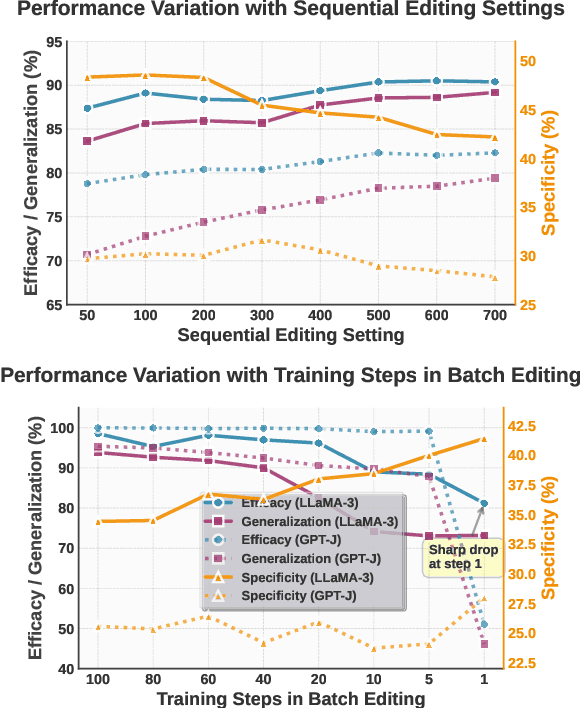

Abstract:Large Language Models (LLMs) underpin many AI applications, but their static nature makes updating knowledge costly. Model editing offers an efficient alternative by injecting new information through targeted parameter modifications. In particular, meta-learning-based model editing (MLBME) methods have demonstrated notable advantages in both editing effectiveness and efficiency. Despite this, we find that MLBME exhibits suboptimal performance in low-data scenarios, and its training efficiency is bottlenecked by the computation of KL divergence. To address these, we propose $\textbf{S}$tep $\textbf{M}$ore $\textbf{Edit}$ ($\textbf{SMEdit}$), a novel MLBME method that adopts $\textbf{M}$ultiple $\textbf{B}$ackpro$\textbf{P}$agation $\textbf{S}$teps ($\textbf{MBPS}$) to improve editing performance under limited supervision and a norm regularization on weight updates to improve training efficiency. Experimental results on two datasets and two LLMs demonstrate that SMEdit outperforms prior MLBME baselines and the MBPS strategy can be seamlessly integrated into existing methods to further boost their performance. Our code will be released soon.
SAS: Simulated Attention Score
Jul 10, 2025Abstract:The attention mechanism is a core component of the Transformer architecture. Various methods have been developed to compute attention scores, including multi-head attention (MHA), multi-query attention, group-query attention and so on. We further analyze the MHA and observe that its performance improves as the number of attention heads increases, provided the hidden size per head remains sufficiently large. Therefore, increasing both the head count and hidden size per head with minimal parameter overhead can lead to significant performance gains at a low cost. Motivated by this insight, we introduce Simulated Attention Score (SAS), which maintains a compact model size while simulating a larger number of attention heads and hidden feature dimension per head. This is achieved by projecting a low-dimensional head representation into a higher-dimensional space, effectively increasing attention capacity without increasing parameter count. Beyond the head representations, we further extend the simulation approach to feature dimension of the key and query embeddings, enhancing expressiveness by mimicking the behavior of a larger model while preserving the original model size. To control the parameter cost, we also propose Parameter-Efficient Attention Aggregation (PEAA). Comprehensive experiments on a variety of datasets and tasks demonstrate the effectiveness of the proposed SAS method, achieving significant improvements over different attention variants.
How to Complete Domain Tuning while Keeping General Ability in LLM: Adaptive Layer-wise and Element-wise Regularization
Jan 23, 2025Abstract:Large Language Models (LLMs) exhibit strong general-purpose language capabilities. However, fine-tuning these models on domain-specific tasks often leads to catastrophic forgetting, where the model overwrites or loses essential knowledge acquired during pretraining. This phenomenon significantly limits the broader applicability of LLMs. To address this challenge, we propose a novel approach to compute the element-wise importance of model parameters crucial for preserving general knowledge during fine-tuning. Our method utilizes a dual-objective optimization strategy: (1) regularization loss to retain the parameter crucial for general knowledge; (2) cross-entropy loss to adapt to domain-specific tasks. Additionally, we introduce layer-wise coefficients to account for the varying contributions of different layers, dynamically balancing the dual-objective optimization. Extensive experiments on scientific, medical, and physical tasks using GPT-J and LLaMA-3 demonstrate that our approach mitigates catastrophic forgetting while enhancing model adaptability. Compared to previous methods, our solution is approximately 20 times faster and requires only 10%-15% of the storage, highlighting the practical efficiency. The code will be released.
SWSC: Shared Weight for Similar Channel in LLM
Jan 15, 2025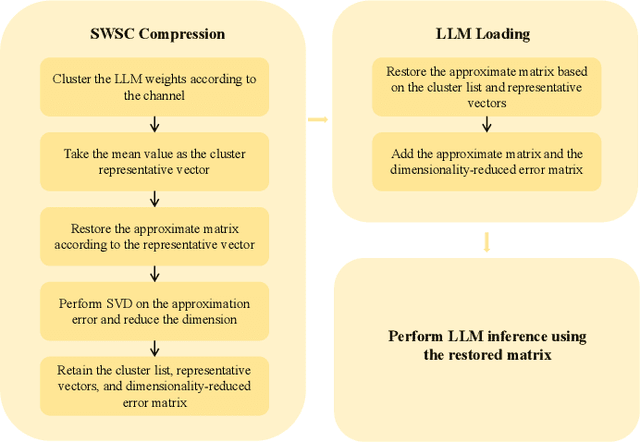
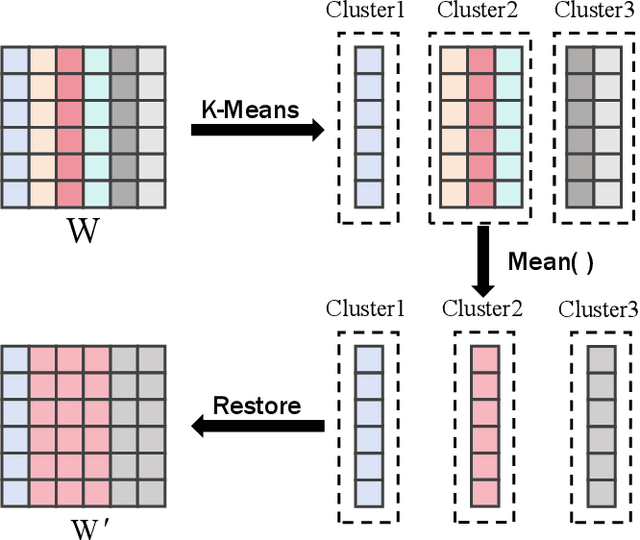

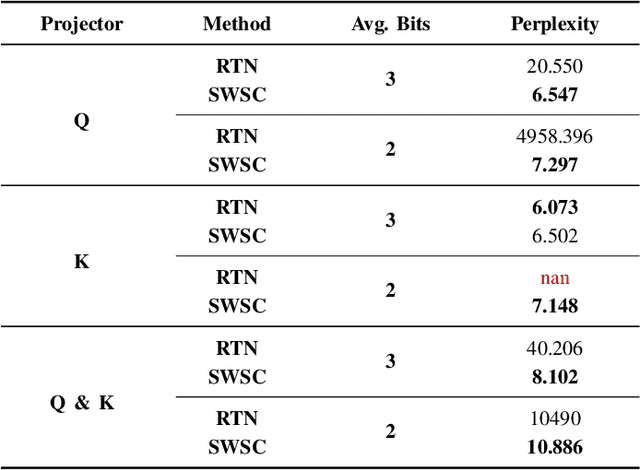
Abstract:Large language models (LLMs) have spurred development in multiple industries. However, the growing number of their parameters brings substantial storage and computing burdens, making it essential to explore model compression techniques for parameter reduction and easier deployment. We propose SWSC, an LLM compression method based on the concept of Shared Weight for Similar Channel. It uses the K-Means clustering algorithm to cluster model weights channel-by-channel, generating clusters with highly similar vectors within each. A representative vector from each cluster is selected to approximately replace all vectors in the cluster, significantly reducing the number of model weight parameters. However, approximate restoration will inevitably cause damage to the performance of the model. To tackle this issue, we perform singular value decomposition on the weight error values before and after compression and retain the larger singular values and their corresponding singular vectors to compensate for the accuracy. The experimental results show that our method can effectively ensure the performance of the compressed LLM even under low-precision conditions.
DeepSeek-V3 Technical Report
Dec 27, 2024



Abstract:We present DeepSeek-V3, a strong Mixture-of-Experts (MoE) language model with 671B total parameters with 37B activated for each token. To achieve efficient inference and cost-effective training, DeepSeek-V3 adopts Multi-head Latent Attention (MLA) and DeepSeekMoE architectures, which were thoroughly validated in DeepSeek-V2. Furthermore, DeepSeek-V3 pioneers an auxiliary-loss-free strategy for load balancing and sets a multi-token prediction training objective for stronger performance. We pre-train DeepSeek-V3 on 14.8 trillion diverse and high-quality tokens, followed by Supervised Fine-Tuning and Reinforcement Learning stages to fully harness its capabilities. Comprehensive evaluations reveal that DeepSeek-V3 outperforms other open-source models and achieves performance comparable to leading closed-source models. Despite its excellent performance, DeepSeek-V3 requires only 2.788M H800 GPU hours for its full training. In addition, its training process is remarkably stable. Throughout the entire training process, we did not experience any irrecoverable loss spikes or perform any rollbacks. The model checkpoints are available at https://github.com/deepseek-ai/DeepSeek-V3.
LSAQ: Layer-Specific Adaptive Quantization for Large Language Model Deployment
Dec 24, 2024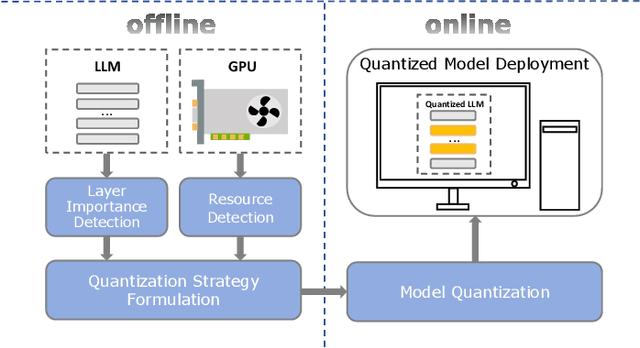

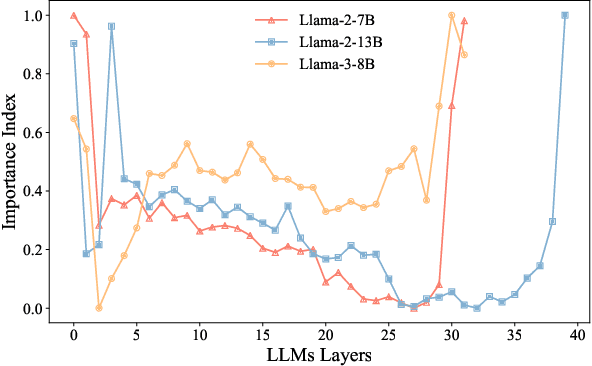
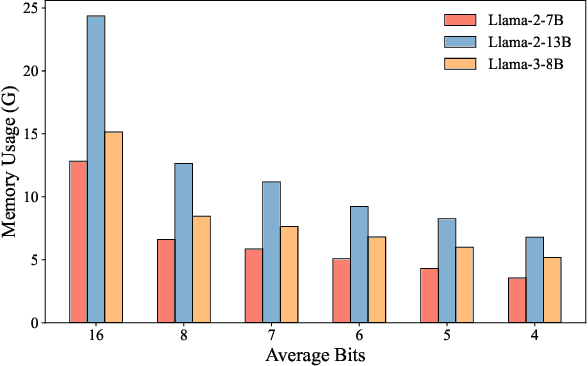
Abstract:As large language models (LLMs) demonstrate exceptional performance across various domains, the deployment of these models on edge devices has emerged as a new trend. Quantization techniques, which reduce the size and memory footprint of LLMs, are effective for enabling deployment on resource-constrained edge devices. However, existing one-size-fits-all quantization methods often fail to dynamically adjust the memory consumption of LLMs based on specific hardware characteristics and usage scenarios. To address this limitation, we propose LSAQ (Layer-Specific Adaptive Quantization), a system for adaptive quantization and dynamic deployment of LLMs based on layer importance. LSAQ evaluates layer importance by constructing top-k token sets from the inputs and outputs of each layer and calculating their Jaccard coefficient. Using this evaluation, the system adaptively adjusts quantization strategies in real time according to the resource availability of edge devices, assigning different precision levels to layers of varying importance. This approach significantly reduces the storage requirements of LLMs while maintaining model performance, enabling efficient deployment across diverse hardware platforms and usage scenarios.
 Add to Chrome
Add to Chrome Add to Firefox
Add to Firefox Add to Edge
Add to Edge